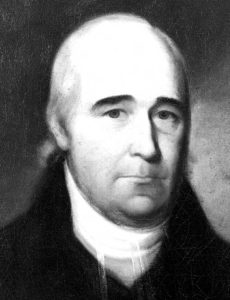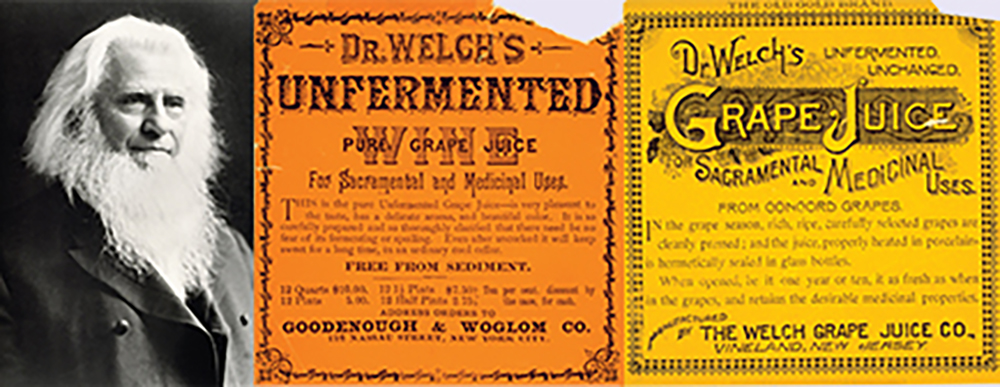In Primitive Baptists of the Wiregrass South, author John G. Crowley writes that for those Appalachian Baptists, “the use of fermented wine, usually made by the deacons” is standard in their celebration of the Lord’s Supper, a biblical mandate they retained as other Protestants caved to Temperance grape juice. (Some 19th-century Southern Baptists went to great lengths to prove that the wine referenced in the New Testament was nonalcoholic.)

Bill Leonard
Crowley cites Elder Bob Dickerson from the Cat Creek Primitive Baptist Church in Lowndes County, Ga., who “once remarked that the Missionary (Southern Baptist) and Methodist use of grape juice in Communion was quite appropriate, since their doctrines bore the same resemblance to truth as grape juice bore to wine.”
Biblical literalism and biblical inerrancy sometimes collide.
Formally or informally, these Appalachian mountain churches affirm biblical inerrancy, their particular actions and beliefs governed by the principle “The Bible says it, I believe it, that settles it.”
“To affirm biblical inerrancy is a dramatic commitment. Once that’s done, the responsibilities are considerable.”
Closer examination suggests the Bible may say it; folks may believe it; but that doesn’t always “settle it.” To affirm biblical inerrancy is a dramatic commitment. Once that’s done, the responsibilities are considerable. Case in point, the Southern Baptist Convention 2024.
SBC and women
This June, “messengers” representing SBC-aligned congregations will take a second required vote to add this phrase to the denomination’s constitution: “a church (is) in friendly cooperation with the convention … when … it affirms, appoints and employs only men as any kind of pastor or elder as qualified by Scripture.” That requirement was added to the SBC’s confession of faith, the Baptist Faith and Message, in 2000. Churches with female pastors are being ferreted out and dismissed, apparently with more diligence than were sexually abusive male “pastors.”
Efforts at officially prohibiting ordained female pastors were evident in a 1984 convention resolution declaring:
The Scriptures attest to God’s delegated order of authority (God the head of Christ, Christ the head of man, man the head of woman, man and woman dependent one upon the other to the glory of God) distinguishing the roles of men and women in public prayer and prophecy (1 Cor. 11:2-5); The Scriptures teach that women are not in public worship to assume a role of authority over men lest confusion reign in the local church (1 Cor. 14:33-36); and while Paul commends women and men alike in other roles of ministry and service (Titus 2:1-10), he excludes women from pastoral leadership (1 Tim. 2:12) to preserve a submission God requires because the man was first in creation and the woman was first in the Edenic fall (1 Tim. 2:13ff).
That resolution suggested the only time women were theologically “first” was when Eve committed the original sin, textual evidence that husbands have been blaming wives for everything from eating “the fruit of the tree” at Creation, to hoisting an upside down flag supporting a 2021 insurrection. But I digress.
Chicago Statement
Whether in 1984 or 2024, Southern Baptists anchor biblical authority in the Chicago Statement of Biblical Inerrancy, published in 1978 and signed by various Southern Baptist leaders including Paige Patterson and Paul Pressler.
In its “summary statement,” the document includes these two sections:
Being wholly and verbally God-given, Scripture is without error or fault in all its teaching, no less in what it states about God’s acts in creation, about the events of world history, and about its own literary origins under God, than in its witness to God’s saving grace in individual lives.
The authority of Scripture is inescapably impaired if this total divine inerrancy is in any way limited or made relative to a view of truth contrary to the Bible’s own; and such lapses bring serious loss to both the individual and the Church.
The first paragraph highlights the depth of biblical inerrancy, applied not only to the good news of God’s redemptive grace, but also to topics related to science, history, indeed, “all its teaching.” The second paragraph indicates that compromising Scripture’s complete “divine inerrancy” in any way results in “serious loss” with personal and communal impact.
“Who sets those boundaries? The biblical text itself, or its inerrant interpreters?”
The warning is clear: biblical inerrancy is total with non-negotiable boundaries for the “individual and the church.” But who sets those boundaries? The biblical text itself, or its inerrant interpreters?
Some context to consider
Before voting on this most recent constitutional addition, Southern Baptists might consider certain historical, theological and contextual perils that accompany it.
First, historically, it appears the same hermeneutical/interpretive methods used to oppose female pastors are strangely parallel to the hierarchical hermeneutic SBC founders utilized in defense of slaveholding. The denomination’s origins illustrate the peril of co-opting the biblical text to support a gospel-denying practice, in this case chattel slavery.

Richard Furman
Richard Furman, pastor of First Baptist Church of Charleston, S.C., articulated that hermeneutic in an 1822 letter to the South Carolina governor, 43 years before the SBC began. In his “Exposition” Furman asserted: “The right of holding slaves is clearly established in the Holy Scriptures, both by precept and example.”
Furman linked biblical support for slavery with its endorsement of civil “magistracy, the husband’s right to govern (his spouse) and parental authority,” noting that “neither civil or ecclesiastical authority can consistently interfere with the possession and legitimate exercise of a right given by the Divine Law.”
Thus he concluded: “A master has a scriptural right to govern his slaves so as to keep them in subjection.”
It took 150 years (1845-1995) for Southern Baptists to apologize for their “original sin” of biblical support for slavery. Will it be 2174 before Southern Baptist women, refused a pulpit for a century and a half, receive such an apology?
Second, before voting on this amendment, might Southern Baptists consider what they are suggesting about the nature of the gospel itself? To assert that women cannot be pastors because “Eve was in the transgression” (1 Timothy 2:14) is to undermine the gospel’s transformative grace for female and male alike.
At its best, the church declares that the life, death and resurrection of Jesus Christ is God’s gracious gift to “take away the sins of the world.” Paul wrote that “there is therefore no condemnation to them which are in Christ Jesus, who walk not after the flesh but after the Spirit. For the law of the Spirit of life in Christ Jesus hath made me free from the law of sin and death.” If Eve and her daughters are too cursed to be called, they may be too cursed to be redeemed, and Christ has died in vain.
“If Eve and her daughters are too cursed to be called, they may be too cursed to be redeemed, and Christ has died in vain.”
Third, Southern Baptists might consider the impact of their constitutional approach to biblical inerrancy on their overarching Christian witness. They insist inerrancy compels them to ban females from the pastoral office yet, for many, their current political engagement appears to permit them to wink at, excuse or ignore application of such biblically inerrant demands on certain political leaders. Such actions replace biblical authority with a quasi-biblical, political authoritarianism, imperiling their witness.
When a political leader, Baptist or otherwise, identifies as a “Bible-believing Christian” and, when asked his worldview, responds, “Well, go pick up a Bible off your shelf and read it. That’s my worldview,” that person demands to be evaluated by Scripture. If the individual requires inerrantist-oriented sexual, political and ethical standards for some but not all citizen-politicians, then, per the Chicago Statement, biblical authority (and a Christian witness) are “inescapably impaired if this total divine inerrancy is in any way limited or made relative to a view of truth contrary to the Bible’s own.”
Transforming grace
And what of female pastors in Baptist pulpits? Sometimes God’s transforming grace breaks through. A chapter in my new book, Appalachian Mountain Christianity: the Spirituality of Otherness, concludes with this account:
When Rev. Harold McKinnish’s 12-year-old daughter Linda blurted out: “Daddy, why can’t women preach?” the Southern Baptist pastor responded: “Because God didn’t ordain it.” Yet when he kept telling his congregation to “do whatever God calls you to do,” Linda took him at his word.

Linda McKinnish Bridges
She graduated from the Southern Baptist Theological Seminary with a master of divinity degree, and with her husband, Tilden Bridges, became a Southern Baptist missionary to Taiwan, later returning to the seminary for a Ph.D. in New Testament. When Linda McKinnish Bridges got ordained to the gospel ministry, Brother Harold acknowledged she was “God called” and celebrated her as a gospel preacher. At her Ph.D. graduation he wept uncontrollably.
Invited to teach Greek at the seminary amid the infamous SBC controversy between “conservatives” and “moderates,” McKinnish Bridges was eventually told her contract would not be renewed due to conservative trustee opposition to an ordained woman teaching the Bible to men. When her final semester ended, Brother Harold drove his truck from North Carolina to Louisville to help her empty her seminary office, but before he would permit them to leave the campus, he compelled her to kneel with him in front of the school’s administration building, take off their shoes and shake the dust of the place off their feet.
Linda McKinnish Bridges calls their action a “sacrament of failure” that took her beyond anger and bitterness. Her father’s enthusiastical, Bible-based mountain rhetoric “tangibilified” grace in ways that transformed father and daughter alike. His biblicism set her free when her alma mater stopped being mater, but her call to preach freed him, too, a long way from that Sunday when she was 12. Father proclaimed an audacious Bible-based mountain gospel, and, taking him at his word, daughter made that gospel more biblically audacious than he ever imagined.
I’d drink to that, at Christ’s Table, with wine or grape juice, and with the Baptist female pastors I’m audaciously honored to know, by grace.
Bill Leonard is founding dean and the James and Marilyn Dunn professor of Baptist studies and church history emeritus at Wake Forest University School of Divinity in Winston-Salem, N.C. He is the author or editor of 25 books. A native Texan, he lives in Winston-Salem with his wife, Candyce, and their daughter, Stephanie.
Related articles:
Second vote on Law Amendment will take the spotlight at this summer’s SBC annual meeting
What explains the abiding appeal of biblical inerrancy? | Opinion by Alan Bean


